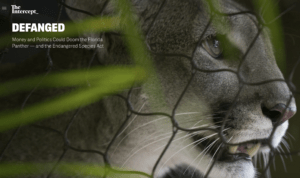
For Jimmy Tobias (’16), investigative reporting is a lot like building a trail.
“It’s a slow, deliberate enterprise that rewards experience and attention to detail,” he said.
Tobias knows quite a bit about both. Before attending Berkeley Journalism, he worked as a wilderness trail technician for the U.S. Forest Service and the Montana Conservation Corps, which he describes as a “magical experience.”

Tobias published this story about the endangered Florida panther in The Intercept in Jan. 2021 (Photo: Joe Raedle/Getty Images)
Since graduating from Berkeley Journalism in 2016, he’s been reporting on environmental issues with a focus on extinction and extraction. His most recent investigation “Defanged: Money and Politics Could Doom the Florida Panther – and the Endangered Species Act” was published in The Intercept in Jan. 2021.
Tobias is a frequent contributor to The Nation and The Guardian. His work has also appeared in The New York Times, High Country News, Pacific Standard, HuffPost, Mother Jones, and Outside. He was recently awarded the 2021 Alicia Patterson Fellowship and is working on an investigative series about the U.S. Fish and Wildlife Service and its struggle to confront the global extinction crisis.
He recently spoke to Berkeley Journalism students about his time at the School and the Investigative Reporting Program (IRP), where he worked as a research assistant, and the opportunities and challenges in environmental reporting. Here are some highlights of that conversation, which have been edited for clarity:
How Berkeley Journalism launched him into investigative reporting:
One of things about the J-School that was really helpful was being around people who had done investigations and who made it feel possible. It can be so daunting to start on a new project when you don’t know where it’s going to go. You don’t know how long it’s going to take. When I was there, Lowell Bergman ran the IRP and he had a team with him. Watching them all work on these long-term investigations was really inspirational… I had a part-time gig at the IRP, where I would help people with their projects. Working through lists of people to call or documents to read … figuring out who your sources are, contacting them, figuring out relevant records, trying to read through them. Those were all helpful experiences.
On his obsession with filing Freedom of Information Act (FOIA) requests:
A few years out of school, I got into FOIA, which really changed the way I was reporting and enabled me to get a bunch of scoops and actually break news in a way I hadn’t been doing before…Especially if you’re freelancing, it helps to have a beat or two that you know a lot about and also the ability to break news. … Public records requests are a great way to get that information that even big papers don’t necessarily have. That’s sort of been my trajectory.
I would really encourage people to file public records requests as much as possible … Filing ten a month or 20 a month is a really great thing to do. … If you know you’re going to work on a project in three or six months, file the request now. The process is often slow. … If you don’t have access to lawyers who are willing to sue for you, you are at the mercy of these agencies to fulfill their obligations.
One of my first ever requests was for the calendar of this official at the Interior Department. I just wanted to see what his calendar was like. I just FOIA’d for his calendar. A few months later, I got his calendar. I knew enough about him to know where he had worked before he joined the Interior Department. When I was flipping through his calendar, I saw that he had a meeting with his former employer in the early months of the administration. That was a big red flag because that’s against federal ethics rules. I wrote an article about it and then wrote another article about it. An unrelated NGO filed an ethics complaint against him. Then the Inspector general opened an investigation and put out a report about how he had broken federal ethics laws. … That was one of the first FOIA requests I had ever filed. It’s amazing what this law can do. I didn’t know what I was doing. I just wanted to get this calendar and see what was in there and it led to this series of stories and this investigation into this guy. Even really simple requests can get a lot of great information.
Reporting in environmental issues and agencies during the Biden administration:
The Obama administration was not very good for the Endangered Species Act. The Trump administration was definitely worse. The jury is out on Biden. While I’m still focused on the same issues, I’m trying to dig in a little bit more into these systemic problems that carry over from administration to administration: the rotten culture among the leadership at Fish and Wildlife and other agencies that have been beaten down over the years, and the careerists willing to sacrifice good science and law for advancement and for political reasons. I’m looking at the systemic, bureaucratic problems that will live on, even if the Biden administration has the best intentions.
Assessing the impact of his work:
Every story has a different effect. Sometimes there’s no impact at all. But I think the continual coverage of something is really important. Even if one story doesn’t have a huge impact, it teaches you. You build on it. You use it to further what you’re trying to do.
How to make a living as a freelance reporter:
I have two tricks that have helped me to work full-time as a reporter. I’ve been fortunate to get contracts at some of the magazines I work for, so I’m not always pitching, which helps a lot. The pitching process can be hard. … The other thing is grants. This grant is going to help me for the next six months. For the Florida panther story, I got a grant from Type Investigations, which was really generous and helpful and covered all the costs.
By Janice Hui
